| Listing 1 - 10 of 24 | << page >> |
Sort by
|
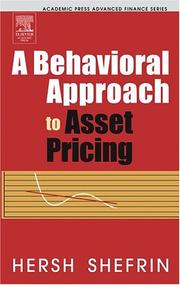
ISBN: 0126393710 0120887835 9786611008369 1281008362 0080476031 1423708229 9781423708223 9780080476032 9781281008367 9780126393712 9780120887835 Year: 2005 Publisher: Amsterdam Elsevier
Abstract | Keywords | Export | Availability | Bookmark
 Loading...
Loading...Choose an application
- Reference Manager
- EndNote
- RefWorks (Direct export to RefWorks)
A Behavioral Approach to Asset Pricing Theory examines the reigning assumptions of asset pricing theory and reconstructs them to incorporate findings from behavioral finance. It constructs a solid, intact structure that challenges classic assumptions and at the same time provides a strong theory and efficient empirical tools. Building on the models developed by both traditional asset pricing theorists and behavioral asset pricing theorists, this book takes the discussion to the next step. The author provides a general behaviorally based intertemporal treatment of asset pricing theory
International financial management --- Capital structure --- Capital assets pricing model --- Risk management --- Capital assets pricing model. --- Risk management. --- 332.63221 --- Insurance --- Management --- Capital asset pricing model --- CAPM (Capital assets pricing model) --- Pricing model, Capital assets --- Capital --- Finance --- Investments --- Mathematical models --- Finances
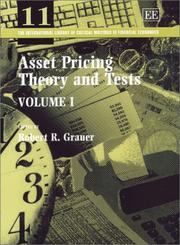
ISBN: 1840644737 9781840644739 Year: 2003 Volume: 11 Publisher: Cheltenham (UK) : Elgar Publishing, Inc,
Abstract | Keywords | Export | Availability | Bookmark
 Loading...
Loading...Choose an application
- Reference Manager
- EndNote
- RefWorks (Direct export to RefWorks)
Capital assets pricing model. --- Capital assets pricing model --- 332.6 --- Capital asset pricing model --- CAPM (Capital assets pricing model) --- Pricing model, Capital assets --- Capital --- Finance --- Investments --- Mathematical models --- Finances
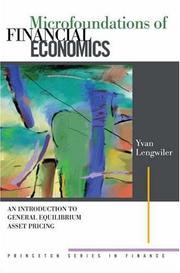
ISBN: 0691113157 9780691113159 Year: 2004 Publisher: Princeton (N.J.) : Princeton university press,
Abstract | Keywords | Export | Availability | Bookmark
 Loading...
Loading...Choose an application
- Reference Manager
- EndNote
- RefWorks (Direct export to RefWorks)
Finance --- Economics --- Capital assets pricing model --- Modèle de fixation du prix des actifs --- Finances --- Économie politique --- Capital assets pricing model. --- Economics. --- Finance. --- 332.015195 --- Capital asset pricing model --- CAPM (Capital assets pricing model) --- Pricing model, Capital assets --- Capital --- Investments --- Economic theory --- Political economy --- Social sciences --- Economic man --- Funding --- Funds --- Currency question --- Mathematical models
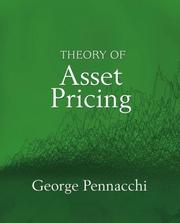
ISBN: 9780321127204 032112720X Year: 2008 Publisher: Boston, Mass. Pearson
Abstract | Keywords | Export | Availability | Bookmark
 Loading...
Loading...Choose an application
- Reference Manager
- EndNote
- RefWorks (Direct export to RefWorks)
Capital assets pricing model --- Securities --- Capital assets pricing model. --- Securities. --- Blue sky laws --- Capitalization (Finance) --- Investment securities --- Portfolio --- Scrip --- Securities law --- Underwriting --- Investments --- Investment banking --- Capital asset pricing model --- CAPM (Capital assets pricing model) --- Pricing model, Capital assets --- Capital --- Finance --- Law and legislation --- Mathematical models --- Capital structure --- Prices
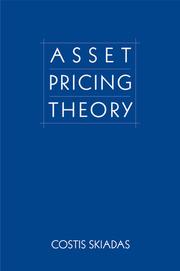
ISBN: 9780691139852 0691139857 Year: 2009 Publisher: Princeton, N.J. Princeton University Press
Abstract | Keywords | Export | Availability | Bookmark
 Loading...
Loading...Choose an application
- Reference Manager
- EndNote
- RefWorks (Direct export to RefWorks)
"Asset Pricing Theory is an advanced textbook for doctoral students and researchers that offers a modern introduction to the theoretical and methodological foundations of competitive asset pricing." "Costis Skiadas develops in depth the fundamentals of arbitrage pricing, mean-variance analysis, equilibrium pricing, and optimal consumption/portfolio choice in discrete settings, but with emphasis on geometric and martingale methods that facilitate an effortless transition to the more advanced continuous-time theory." "Asset Pricing Theory is complete with extensive exercises at the end of every chapter and comprehensive mathematical appendixes, making this book a self-contained resource for graduate students and academic researchers, as well as mathematically sophisticated practitioners seeking a deeper understanding of concepts and methods on which practical models are built."--BOOK JACKET.
Money market. Capital market --- Prices --- Capital assets pricing model --- Finance --- 332.6 --- 305.91 --- 339.40 --- AA / International- internationaal --- Capital asset pricing model --- CAPM (Capital assets pricing model) --- Pricing model, Capital assets --- Capital --- Investments --- Mathematical models --- Econometrie van de financiële activa. Portfolio allocation en management. CAPM. Bubbles --- Vermogenbeheer. financiële analyse (algemeenheden)
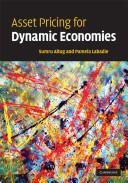
ISBN: 9780521875851 9780521699143 9780511753909 9780511429569 0511429568 9781281791467 9780511426896 0511426895 051175390X 9780511429941 0511429940 9780511429170 0511429177 1281791466 9780511428463 0511428464 0521875854 0521699142 1107714060 9781107714069 9786611791469 6611791469 051142776X Year: 2008 Publisher: Cambridge Cambridge University Press
Abstract | Keywords | Export | Availability | Bookmark
 Loading...
Loading...Choose an application
- Reference Manager
- EndNote
- RefWorks (Direct export to RefWorks)
This introduction to general equilibrium modelling takes an integrated approach to the analysis of macroeconomics and finance. It provides students, practitioners, and policymakers with an easily accessible set of tools that can be used to analyze a wide range of economic phenomena. Key features: • Provides a consistent framework for understanding dynamic economic models • Introduces key concepts in finance in a discrete time setting • Develops simple recursive approach for analyzing a variety of problems in a dynamic, stochastic environment • Sequentially builds up the analysis of consumption, production, and investment models to study their implications for allocations and asset prices • Reviews business cycle analysis and the business cycle implications of monetary and international models • Covers latest research on asset pricing in overlapping generations models and on models with borrowing constraints and transaction costs • Includes end-of-chapter exercises allowing readers to monitor their understanding of each topic Online resources are available at www.cambridge.org/altug_labadie
Pricing --- International finance --- Capital assets pricing model --- AA / International- internationaal --- 305.91 --- 339.40 --- Econometrie van de financiële activa. Portfolio allocation en management. CAPM. Bubbles. --- Vermogenbeheer. financiële analyse (algemeenheden). --- Capital asset pricing model --- CAPM (Capital assets pricing model) --- Pricing model, Capital assets --- Capital --- Finance --- Investments --- Econometrie van de financiële activa. Portfolio allocation en management. CAPM. Bubbles --- Vermogenbeheer. financiële analyse (algemeenheden) --- Mathematical models --- Capital assets pricing model. --- Finance. --- Funding --- Funds --- Economics --- Currency question --- Business, Economy and Management
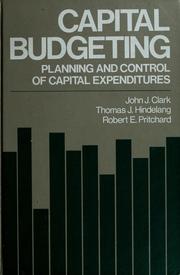
ISBN: 0131134647 9780131134645 Year: 1979 Publisher: Englewood Cliffs (N.J.): Prentice Hall
Abstract | Keywords | Export | Availability | Bookmark
 Loading...
Loading...Choose an application
- Reference Manager
- EndNote
- RefWorks (Direct export to RefWorks)
Investment management --- Capital budget. --- Cash flow --- Capital assets pricing model. --- 658.1 --- 658.15 --- Capital assets pricing model --- Capital budget --- budget de capital --- Corporations --- Liquidity (Economics) --- Capital budgeting --- Budget --- Capital investments --- Public investments --- Capital asset pricing model --- CAPM (Capital assets pricing model) --- Pricing model, Capital assets --- Capital --- Finance --- Investments --- Forms of enterprise. Finances --- Private financial management. Financial administration of enterprises --- kapitaalbegroting --- Mathematical models --- 658.15 Private financial management. Financial administration of enterprises --- 658.1 Forms of enterprise. Finances
Book
ISBN: 0691043027 9780691043029 Year: 1992 Publisher: Princeton (N.J.): Princeton university press
Abstract | Keywords | Export | Availability | Bookmark
 Loading...
Loading...Choose an application
- Reference Manager
- EndNote
- RefWorks (Direct export to RefWorks)
Capital assets pricing model. --- Portfolio management. --- Uncertainty. --- 336.767 --- Capital assets pricing model --- Portfolio management --- Uncertainty --- Reasoning --- Investment management --- Investment analysis --- Investments --- Securities --- Capital asset pricing model --- CAPM (Capital assets pricing model) --- Pricing model, Capital assets --- Capital --- Finance --- Investering. Belegging. Portfolio. Portfoliotheorie. --(toepassing voor kapitaalkosten in de onderneming zie {658.15}) --- Mathematical models --- 336.767 Investering. Belegging. Portfolio. Portfoliotheorie. --(toepassing voor kapitaalkosten in de onderneming zie {658.15})
Book
ISBN: 9781107006713 1107006716 9780521186513 052118651X 9781139017459 1107227550 1139189484 9786613382542 1139188186 1139183567 1139017454 1283382547 1139190784 1139185888 1139179748 9781139190787 9781139185882 9781107227552 9781283382540 661338254X 9781139189484 9781139188180 9781139183567 Year: 2012 Publisher: New York Cambridge University Press
Abstract | Keywords | Export | Availability | Bookmark
 Loading...
Loading...Choose an application
- Reference Manager
- EndNote
- RefWorks (Direct export to RefWorks)
"Project Theory and the classical models in finance (e.g., the CAPM) seemingly contradict each other, creating a teachin and a research dilemma to professors in finanace and econommics, This tension is particualrly strong for professors who teach both the CAPM and behavioral finance. This book bridges between Prospect Theory and the Classical Models in finance showing that there is no contradictions between them"--
Capital asset pricing model --- Capital assets pricing model --- AA / International- internationaal --- 305.91 --- 339.42 --- CAPM (Capital assets pricing model) --- Pricing model, Capital assets --- Capital --- Finance --- Investments --- Econometrie van de financiële activa. Portfolio allocation en management. CAPM. Bubbles. --- Financiële analyse. --- Mathematical models --- Econometrie van de financiële activa. Portfolio allocation en management. CAPM. Bubbles --- Financiële analyse --- Business, Economy and Management --- Economics --- Capital asset pricing model. --- Capital assets pricing model.
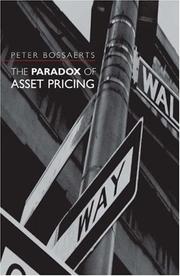
ISBN: 0691123136 1306154197 0691090297 1400850665 9781400850662 9780691090290 Year: 2013 Publisher: Princeton, NJ
Abstract | Keywords | Export | Availability | Bookmark
 Loading...
Loading...Choose an application
- Reference Manager
- EndNote
- RefWorks (Direct export to RefWorks)
Asset pricing theory abounds with elegant mathematical models. The logic is so compelling that the models are widely used in policy, from banking, investments, and corporate finance to government. To what extent, however, can these models predict what actually happens in financial markets? In The Paradox of Asset Pricing, a leading financial researcher argues forcefully that the empirical record is weak at best. Peter Bossaerts undertakes the most thorough, technically sound investigation in many years into the scientific character of the pricing of financial assets. He probes this conundrum by modeling a decidedly volatile phenomenon that, he says, the world of finance has forgotten in its enthusiasm for the efficient markets hypothesis--speculation. Bossaerts writes that the existing empirical evidence may be tainted by the assumptions needed to make sense of historical field data or by reanalysis of the same data. To address the first problem, he demonstrates that one central assumption--that markets are efficient processors of information, that risk is a knowable quantity, and so on--can be relaxed substantially while retaining core elements of the existing methodology. The new approach brings novel insights to old data. As for the second problem, he proposes that asset pricing theory be studied through experiments in which subjects trade purposely designed assets for real money. This book will be welcomed by finance scholars and all those math--and statistics-minded readers interested in knowing whether there is science beyond the mathematics of finance. This book provided the foundation for subsequent journal articles that won two prestigious awards: the 2003 Journal of Financial Markets Best Paper Award and the 2004 Goldman Sachs Asset Management Best Research Paper for the Review of Finance.
Market theory, Efficient --- Capital assets pricing model --- Efficient market theory --- Securities --- E-books --- 332.6 --- 305.91 --- AA / International- internationaal --- Blue sky laws --- Capitalization (Finance) --- Investment securities --- Portfolio --- Scrip --- Securities law --- Underwriting --- Investments --- Investment banking --- Capital market --- Stock exchanges --- Capital asset pricing model --- CAPM (Capital assets pricing model) --- Pricing model, Capital assets --- Capital --- Finance --- Econometrie van de financiële activa. Portfolio allocation en management. CAPM. Bubbles --- Law and legislation --- Mathematical models --- Capital assets pricing model. --- Efficient market theory. --- Securities.
| Listing 1 - 10 of 24 | << page >> |
Sort by
|

 Search
Search Feedback
Feedback About UniCat
About UniCat  Help
Help News
News